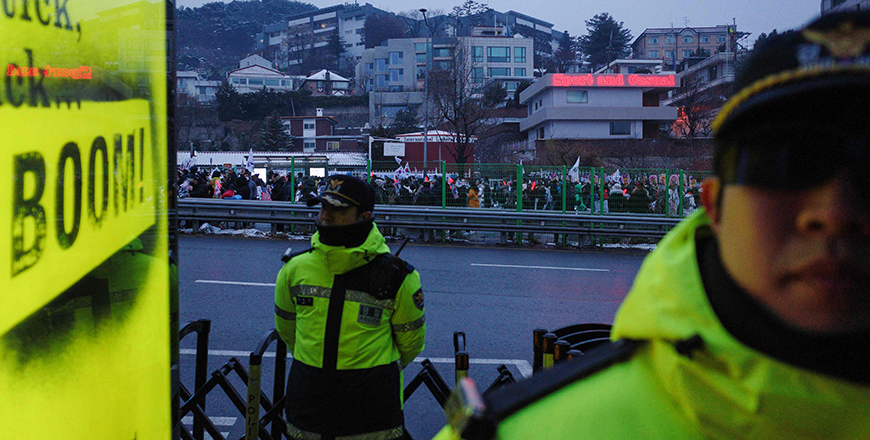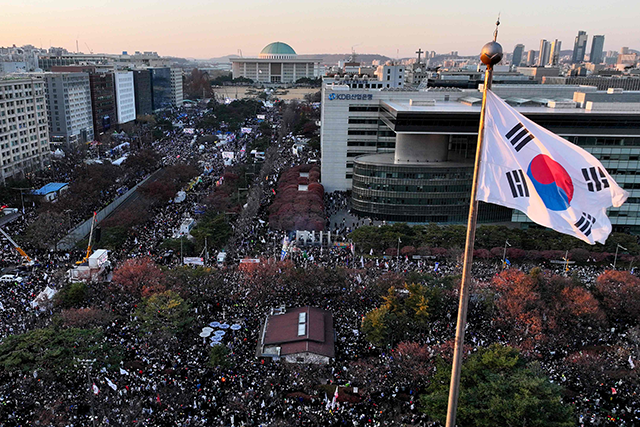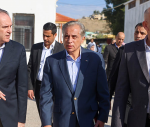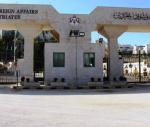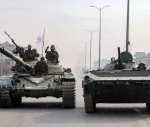You are here
South Korea's political crisis: what could happen next?
By AFP - Jan 04,2025 - Last updated at Jan 04,2025
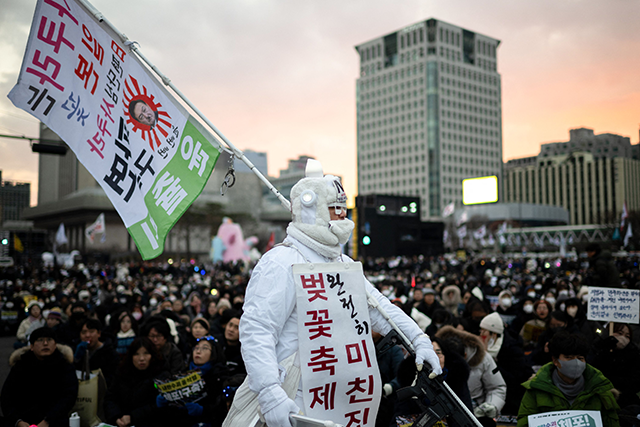
An anti-Japan activist carrying a flag with the portrait of impeached South Korea's president Yoon Suk Yeol takes part in a rally to protest against him in front of the Gwanghwamun Gate in Seoul on January 4, 2025 (AFP photo)
SEOUL — South Korean investigators attempted to arrest impeached President Yoon Suk Yeol at his residence Friday over a failed martial law bid but was blocked by his security forces.
They stood down just days before the warrant's deadline expires on Monday.
AFP takes a look at what could happen next
Another arrest
The Corruption Investigation Office (CIO) may attempt to execute the arrest warrant for Yoon again before the January 6 deadline.
"Future actions will be decided after further review," it said after halting its initial attempt.
If he is arrested before that date, the CIO will have 48 hours to either request a new warrant for his formal arrest or release him.
Yoon's lawyers have repeatedly said that the warrant issued by the court is "unlawful" and "illegal", pledging to take further legal action against it.
The Presidential Security Service has also asserted that the CIO "unlawfully intruded" into the presidential residence and said it would hold the investigators "legally accountable" for their actions.
Even if January 6 comes and goes, the CIO can reapply for the same seven-day detention warrant.
Stronger warrant
If they fail to detain Yoon before the January 6 deadline, investigators could seek a new, stronger arrest warrant that would allow them to detain him longer than the 48 hours allowed under the current court order.
Experts say the likelihood of a court approving it is not low, given that Yoon has already refused to appear for questioning three times and has not complied with the existing warrant.
The stronger warrant is typically issued when "a suspect refuses to cooperate with the investigation", political commentator Park Sang-byung told AFP.
Yoon has also "incited and encouraged extreme (right-wing) supporters, which could be seen as effectively admitting to the criminal charges in the eyes of the court," he added.
But executing this type of warrant, even if issued by the court, may not be feasible if Yoon again refuses to leave his residence with the assistance of his security forces, which include a military unit.
Acting president acts
The prolonged standoff within the presidential residence compound Friday led the CIO and opposition Democratic Party to urge acting President Choi Sang-mok to order the presidential security service to cooperate.
"It is practically impossible to execute the arrest warrant as long as the security officials from the Presidential Security Service continue their protection," the CIO said in a statement.
Choi, a member of Yoon's ruling People Power Party who also serves as deputy prime minister and finance minister, is yet to comment on the issue.
Experts suggest that if Choi orders the security service to cooperate, the chances of Yoon being arrested before the January 6 deadline will increase.
But the acting president has already faced severe backlash from his party for appointing two new justices to fill three vacancies on the Constitutional Court.
That decision has increased the likelihood of the court upholding Yoon's impeachment, with at least six out of eight needed to back the decision.
Given the situation, "it is unlikely that Choi would cooperate with the CIO's request," Shin Yul, a political science professor at Myongji University, told AFP.
Choi's short-lived predecessor in the role of acting president and prime minister, Han Duck-soo, was impeached by lawmakers who argued he refused a key opposition demand to install three extra judges at the Constitutional Court, viewed as impeding Yoon's potential removal from office.
'Wait' for court
South Korea's Constitutional Court has up to 180 days to determine whether to dismiss Yoon as president or restore his powers.
Until then, while suspended, Yoon holds the title of president.
Experts suggest the process for investigators to prosecute or formally arrest Yoon would be much easier were he to be stripped of the presidential title.
But the 180-day timeframe is considerable and could potentially delay proceedings significantly.
The Constitutional Court has said it will expedite the impeachment trial due to the seriousness of the case.
But Yoon's lawyers argued Friday that the court must utilise the full 180 days to conduct the hearings, especially to examine "the circumstances that led to the declaration of martial law".
Related Articles
SEOUL — Rival South Korean protesters were set to brave a snowstorm Sunday over suspended President Yoon Suk Yeol who was still resisting ar
SEOUL — South Korean lawmakers on Saturday impeached President Yoon Suk Yeol over his failed martial law bid, with the opposition declaring
SEOUL — South Korea's main opposition party said Sunday it will try again to impeach President Yoon Suk Yeol after his declaration of martia


